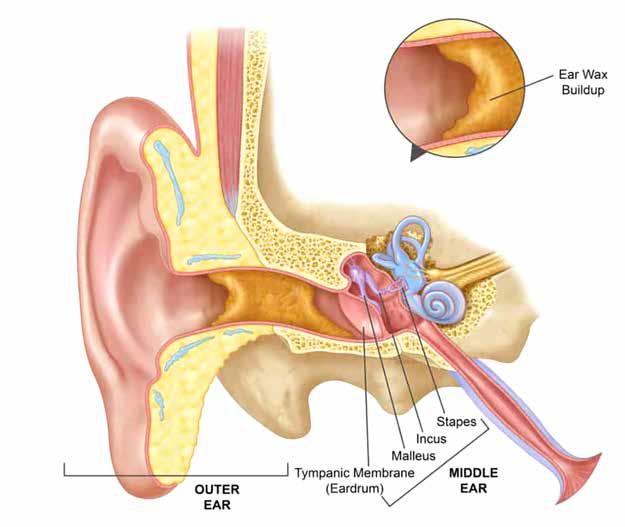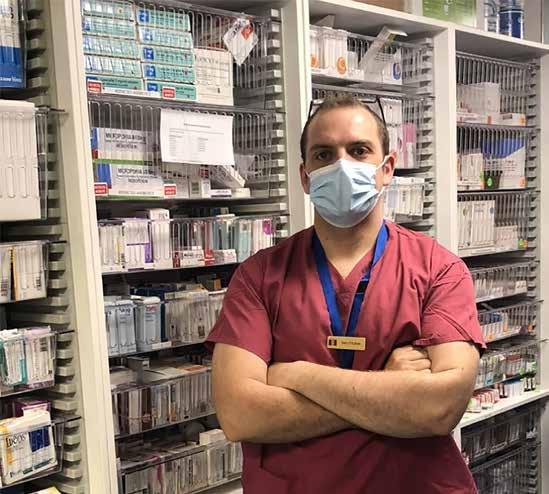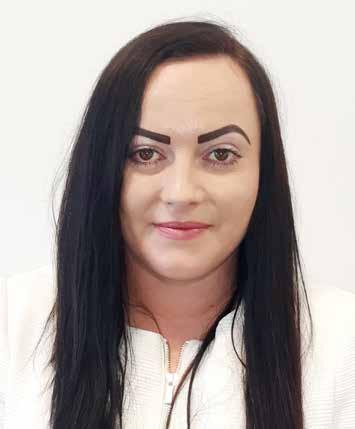
17 minute read
FEATURE: EAR CARE
Listen Up!
Ear Care Management in Pharmacy
Pharmacy management of ear conditions moves sharply into pharmacy focus during the winter months, with customers looking for advice about treating the whole range of symptoms of a winter cold or virus. Along with everyday illnesses, some concerned customers may also visit a pharmacy to ask for advice about conditions such as tinnitus, and more common ear infections.
There are a plethora of common ear complaints that people will present to their pharmacy with. Ear infections are a usual occurrence with most children experiencing at least one, whilst record numbers of the population are being diagnosed with hearing loss. Given the importance of this category, the below article takes a brief look at some of the conditions you and your pharmacy team are likely to encounter and how you can help those affected.
Hearing Loss
In Ireland alone, over 300,000 Irish adults have a moderate or greater hearing loss, yet only one in five of these have never sought treatment. Almost 250,000 Irish people have untreated hearing loss which is strongly associated with increased rates of depression, cognitive decline and loneliness. Hearing loss can be present from birth due to genetic or developmental abnormalities, or arise through trauma, disease or loud noise exposure during the lifetime of an individual. The degree of hearing impairment can vary from mild to profound and causes significant social and personal difficulties. Recent studies have indicated a connection between untreated hearing loss and dementia. There are two main types of hearing loss.
Sensorineural Hearing Loss
Sensitive hair cells inside the cochlea, or organ of hearing, are damaged, either naturally through ageing or prolonged noise exposure. Quite often a person suffering with this type of hearing loss will not recognise that they have a problem due to their hearing deteriorating over a very long period of time. Sensorineural hearing loss can also result from ototoxicity. Certain types of medication can have a toxic effect on the cochlea and vestibular system in the inner ear and result in hearing loss.
Conductive Hearing Loss
When sounds are unable to pass from the outer ear to the inner ear, often as the result of a blockage, such as earwax or a build-up of fluid in the middle ear cavity a hearing loss will result. Head trauma with resulting ossicular chain dislocation, Otosclerosis, or excessive bone growth in the middle can also result in a conductive hearing loss. Sometimes both types of hearing loss occur at the same time, this is known as a mixed hearing loss. This occurs when someone has a combination of sensorineural and conductive hearing loss. This results in a disruption to the transmission of sound through the outer and middle ear as well as damage to the hair cells in the inner ear.
Hearing loss in children
The total instances at school entry of unilateral (in one ear) and bilateral (in both ears) mild to profound hearing loss is thought to be of the order of 1 to 2 per 1,000; that means between 3,000 to 4,500 preschool and school age children in Ireland will have a permanent hearing impairment, with potential consequences for education, communication, literacy, social and emotional development, and later employability. The Health Service Executive now run the Newborn Hearing Screening Program to identify

moderate, severe and profound hearing impairments in newborn babies. Newborns identified with a hearing difficulty have a better chance of developing speech and language skills and of making the most of social and emotional interaction from an early age. Pharmacists can help to tackle the issue by spotting hearing problems, educating people about the symptoms and causes, and advising people about where to go for help. As well as discussing the dangers of exposure to loud noise, pharmacists can warn about trauma – for example, making sure that people buying items such as cotton buds know they should not be inserting them into their ears. Research suggests people do not seek help for hearing problems until 10 years after they start, meaning they may miss out on treatment or help. But pharmacists can pick up a great deal simply by observing their patients' behaviour. For example, you may notice that when you speak to them, they tend to look at your mouth in order to follow the conversation. Many people don’t even realise they are lip reading because of hearing problems. With so many people living with hearing loss, pharmacists need to consider how best to optimise communication in their pharmacy to accommodate them.
One option to support hearing aid users is a hearing loop system. This provides a magnetic, wireless signal that is picked up by hearing aids when they are on the right setting. A small microphone at the counter picks up spoken words, and the loop system amplifies it into the patient’s ear. Consultation rooms themselves can also help people with hearing loss to concentrate on what the pharmacist is saying, without distracting background noise. Clear signage enables people to know they can speak to the pharmacist in these areas. Ottis Media is an inflammation of the middle ear and is often associated with sore throats, colds or other respiratory issues where the infection spreads to the middle ear. It is very common in children. The patient can suffer from temporary hearing loss and pain or discomfort in their ear. Patients can avoid ottis media by getting their annual flu vaccination. Ottis Media usually happens very quickly for a short duration. If the patient has had the symptoms for a few weeks or month it may be an acute ear infection and should visit their doctor. Antibiotics are usually prescribed as treatment. The pharmacy can offer pain relief with ear drops or antihistamines if the inflammation is causing discomfort. If customers are prescribed ear drops or use OTC products, it is important they are shown how to use them properly and reminded that ear drops should be discarded 28 days after opening.
Ottis Media with effusion (OME)
or glue ear is very common in young children. It is a build up of fluid and causes hearing loss in one or both ears. In some instances the condition can lead to an infection of the ear if it is not treated. Glue ear is caused by the eustachian tube not working effectively by neglecting to drain the ear of fluid.
In young children, the case can be made for GP sooner than for adults because of the risk of long-term effects. If it is affecting a child’s hearing, it can in turn delay their speech and language development. In all patients with persistent or recurrent glue ear, secondary care monitoring is often required, where surgical insertion of grommets to drain the fluid and restore air flow through the ear might be recommended. Importantly, pharmacists should be mindful that antihistamines and decongestants should not be recommended to patients with glue ear. Ottis Externa is the inflammation of the skin lining the outer ear. This can be the cause of a trauma to the skin, an infection or a skin allergy. Symptoms include an itchy ear, a discharge from the ear canal and pain in moving the jaw. In some extreme cases, ottis externa can lead to a reduction in hearing. If the infection is severe an antibiotic may need to be prescribed. However a patient should be advised to avoid using cotton buds and treat the area with an ointment or ear drops. Also advise customers to keep their ears dry. This will help to stop bacteria from entering the ear canal. Tinnitus is a ringing or buzzing in the ears that comes from the inside of the body rather than an external source. In some cases it can be very severe and affect a person’s daily life. Occasionally a build up of earwax is the cause of tinnitus or it may occur because of a blow the head or loud noises.
Patients who work in noisy environments such as musicians or publicans would be susceptible to the condition which will present as a ringing or buzzing in the ear or occasionally a low frequency noise. Sinusitis is characterised by the inflammation of the lining of the paranasal sinuses. 80% of cases of sinusitis will resolve itself in 14 days. Symptoms of a sinus infection are a green or yellow mucus discharge from the nose and severe facial pain around the cheeks, eyes or forehead. Sufferers should be advised to use nonsteroidal anti-inflammatory drugs (NSAID) or paracetamol to ease their pain from their headache, and systemic or topical decongestants to improve air circulation & mucus drainage. If someone has persistent sinusitis after 14 days they should be advised to visit their GP as this is a warning sign of chronic sinusitis and be the result of a bacterial infection or an allergy. Ear Wax - Earwax helps to protect, clean and lubricate the ears and usually falls out of the ears on its own. Some people are prone to excessive amounts of earwax, which can cause pain, itching and sometimes hearing loss. Excess earwax can often be treated with OTC eardrops to soften the wax so that it falls out more easily – and pharmacists are ideally placed to offer treatment advice before customers visit a GP. Customers will often see a pharmacist first, as this is easier and more accessible than making an appointment with a GP.
Olive oil, sodium bicarbonate and OTC earwax products may help to loosen the wax and ease the symptoms. It is important to ask the right questions, however, to check that the customer has excess earwax, rather than anything more serious, and they should be referred to their GP if they have any pain in the ears or the hearing loss is substantial or continues.
It is important that pharmacists ask a series of initial questions with the aim of confirming or eliminating wax as the cause of the problem, before considering whether it might be something else. Those questions would typically be aimed at eliciting whether the patient has any discharge, acute pain or hearing loss. If they don’t have discharge or pain, but it’s affecting their hearing, then the likelihood is it will be ear wax.

My classmates all took a moment to absorb what Tech leader and Irish woman Anita Sands had just said. We were sitting in a function room of a San Francisco bar at lunchtime on a May week day in 2017. We were there as part of our studies on the Corporate MBA program with the University of Limerick.
Amongst other items, she was discussing the idea of having several careers, in differing roles rather than being a careerist in one segment. This was a concept which resonated strongly with me. Six weeks previously I had accepted a new position, leaving Community Pharmacy for Hospital Pharmacy.
Community Pharmacy was to this point all I knew and had experienced. Summer and term holidays from university I worked in a Pharmacy in Mallow. My pre-registration year was a Community placement. All of my working career to that point was Community Pharmacy but I was eager for a new challenge.
I certainly have learnt a great deal over the years working in the sector, but it was time to unlearn some of the administrative aspects of the Community Pharmacist role. It was time to commence a journey of relearning, moving my focus back to key areas of pharmacology and physiology.
For me one of the most enjoyable aspects of Community Pharmacy

was the relationship-building with regular patients. The Community Pharmacist has a really unique, high-contact position in the landscape of primary care. Over the years I was involved in delivery of pharmacy services to a wide number of Nursing and Residential care units. I derived great satisfaction providing these key pharmacy services, as it gave me a chance to flex my clinical skills. Detailed patient reviews with the medical and nursing teams, and tailoring medications to the patients and their needs was why I became a Pharmacist. Site visits to discuss medications with nurses and patients were very similar to what I do now in the Mater Private Hospital, Cork where I have been for over three years.
The opportunity to move came about when my then employer, Sam McCauley Chemist group, asked me to provide additional Pharmacist support with the contract delivery in the Mater Private Hospital, Cork. For a number of years Sam McCauley’s Chemist group had provided the pharmacy services with on-site Pharmacist cover and off-site dispensing. In later years, with the marked success and expansion of services in the state-of-the-art facility, the contract was brought in-house and the Pharmacy Department of the Mater Private Hospital, Cork went live at the end of March 2020.
There was never going to be a perfect time to move but when Written by: Barry O'Sullivan MPSI MBA Senior Pharmacist, Pharmacy Department, Mater Private Hospital, Cork
you are open to change, you are more likely to grasp the mettle and go for it. Understandably, I had concerns about what the work would be like, being a full time Hospital Pharmacist and fixating on what I didn’t know, but in reality there was much that I did know.
Introspection in the time around the sectoral move threw up plenty of points for consideration such as not having a clinical diploma and no prior experience in hospital. To aid in the integration process, I did a lot of self-guided study, refreshing knowledge around absorption, distribution, metabolism and excretion of medications. I spoke to colleagues in other hospitals and leant on the support of the Pharmacy team members. Never be afraid to ask for help or direction.
In both sectors of pharmacy there are commonalities and transferrable skills. Clear communication, evidence-based decision making and team playing will aid greatly in problem solving. The centre of what we do as Pharmacists is the patient, and we always strive to do our best for them.
Pharmacists are expertly skilled in research skills and communication. We do it all the time, day in, day out, regardless of role or sector. We translate technical information to understandable and relatable data, appropriate to the recipient.
The learning curve at times felt almost vertical but there is an exhilaration to that too. Fuel to mental fire.
My days in the Mater Private Hospital, Cork are busy and demanding. Working across all departments, I provide, along with my Pharmacy Department colleagues, the best care we possibly can.
The pace can be quite fast and the work very varied in hospital. With COVID-19, additional complexities were added, and a greater level of infection control measures are the daily reality for the foreseeable future. For a few months, the type of patient cohort changed in the hospital in line with HSE needs and so knowledge of different types of patient care was required.
A typical day for me is a mixture of chart reviews, patient counselling, clinical staff education, medication queries and aiding in discharge planning from a medication perspective. These were all the expected aspect of the job coming in the door, but additionally there is a wide number of governance committees to do policy and procedural work for. These committees are responsible for a variety of aspects of patient care such as the CPR committee, to the main medication committee: Drugs and Therapeutics. This multi-disciplinary committee has overall governance of medication use with the sole focus of optimal patient care.
Private hospitals in Ireland operate to the standards of Joint Commission International. Their tri-annual routine inspection is preceded with a lot of work across the committees and wider hospital. Pharmacy has a significant part to play in all this so there is of protocol writing, auditing and training around this too.
Over the years I have been lucky enough to tutor some really excellent Intern Pharmacists and I make sure I explain the logic and process I follow to the students under my tutelage. Regardless of sector, the key messages have been the same: clear communication, robust processes and keeping the patient at the centre of all your activities. Again these are commonalities for all Pharmacists.
Pharmacists are a versatile and adaptive profession; with treatment guidance constantly changing, coupled with stock supply and legislative changes, we have to be.
With the success of the Mater Private Hospital Cork in recent years, the future holds many exciting expansion plans. The addition of new specialities and units will see the Pharmacy department challenged in a positive way to support this growth.
Don’t be scared of change, if change is what you seek.
Ireland’s newest Pharmacy Buying Platform

IndePharm Ltd., the Buying Group behind the Haven Pharmacy Group, has launched an innovative buying platform which aims to revolutionise purchasing in Irish pharmacies.
The new platform – IndeGo Plus – has been in operation in Haven’s 49 pharmacies for the last 12 months where it has had a significant impact on the Group’s performance. The system is the first of its kind as it interacts directly with the pharmacy dispensary system and automatically orders the best priced product that is in stock. Uniquely, it offers its users flexibility and control over ordering and can be tailored to suit each pharmacy’s individual needs and it ensures that consistency in ordering no matter who places the order, so margins are always maintained.
Daragh Connolly, IndePharm’s Chairman, said that IndeGo Plus was developed as a result of the challenges that pharmacies are facing today – time pressures, decreasing HSE payments, stock shortages and pressure on margins.
“IndeGo Plus has proven its worth to our pharmacies by taking the hard work out of ordering and has improved our gross margin and now, we are very excited to share IndeGo Plus with pharmacies across Ireland.

“We understand that pharmacies have different needs so a ‘one size fits all’ approach to purchasing does not suit everyone. With IndeGo Plus, pharmacies have an input into how product selections are made so pharmacies get the products they want.”

them maximise their buying potential and increase their margins at a critical time in the industry,” added Darragh.
Maria Kenyon, IndePharm’s Commercial and Finance Manager, commented, “We have been buying since 2008 and have always punched above our weight in terms of gross margin in the pharmacy industry. IndeGo Plus goes a step further

in maintaining consistency of product and saving time whilst ensuring gross margins are maximised even if the pharmacy owner is not there.
“We understand what is important to both our customers and pharmacies and we have designed IndeGo Plus so that the different needs are catered for without compromising on margin.”
The Review of the Irish Pharmacy Sector for 2019 reported that the pharmacy sector has continued to experience significant economic pressure and that it is essential for pharmacists to maximise all revenue and profit generating opportunities.
“Now, more than ever, pharmacists need to focus their time on their patients and their teams. They need to be confident that they are ordering the right products at the right cost as efficiently as possible. IndeGo Plus does all of that for you,” added Niamh McDermott, Indepharm’s Member Relations Manager.
You can request a brochure by emailing info@indegoplus.ie for further information.
Empowering Independence in Buying

Gives You Control and Confidence
Gives You a Competitive Edge
• Order settings stay in place, no matter who places the order • Monthly reports detailing actual and potential savings • Consistency of products for patient peace of mind • Full visibility and transparency on all pricing
Saves Time and Improves Efficiency
• Tailored settings to benefit from better priced products • Place orders directly from your dispensary system • Intelligently manages out of stock products by automatically selecting the next best priced product in stock
• Benefit from the buying power of IndePharm Buying Group • Aligned to one wholesaler not required • Prices are negotiated to give you the best price available • Experienced team available to support & advise members



